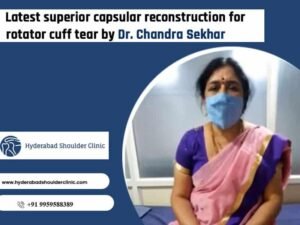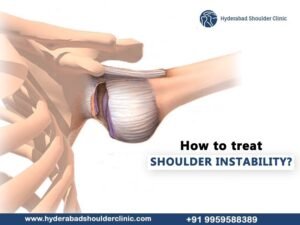A shoulder injury can affect both men and women, resulting in pain and difficulty performing even the simplest tasks. If surgery and physical therapy fail to relieve the pain, you may have your shoulder replaced. This procedure is quite effective, but the real question is how successful it is?
Dr Chandra Sekhar is a shoulder replacement specialist in Hyderabad. Medications and physical therapy will be attempted first, and if these do not work, shoulder arthroscopy will be considered. Depending on the severity of the damage, you may need to undergo a shoulder replacement to live an everyday, pain-free life.
Why may you need shoulder replacement surgery?
It is suggested that when you are incapable of using one or both arms, your shoulder joint will not function normally. Living with constant pain and restrictions is not something anyone wants. The following are some reasons why a shoulder replacement may be required:
- Osteoarthritis or degenerative joint disease
- Rheumatoid arthritis
- Post-traumatic Arthritis
- Avascular Necrosis (Osteonecrosis)
- A broken bone or severe fracture or injury to the shoulder joint
- A torn rotator cuff

Details of shoulder replacement surgery
A shoulder injury can happen to anyone. But it is more common for athletes who play high impact sports like football, hockey, baseball pitchers, tennis players and whose jobs involve repeated use of shoulders are known to experience more shoulder injuries.
In the beginning, Dr Chandra Sekhar, Shoulder Surgeon, evaluates the problem using X-rays, CT scans, MRIs, and various other tests. Depending on the test results, the surgeon can formulate a perfect treatment plan. If your shoulder problem can be treated without replacement, then he would happily prefer that option.
Shoulder replacement surgery can take three forms: Total shoulder replacement, partial shoulder replacement, or reverse shoulder replacement. The shoulder socket and ball are replaced with metal or plastic elements in the damaged area during a total shoulder replacement.
Partial replacement means only the humerus head portion of the damaged shoulder is replaced. And in a reverse shoulder replacement, the metal ball is attached to the shoulder bones(glenoid), and a socket is implanted at the top of the arm (it is the reverse position to the normal shoulder joint). Rotator cuff tears or previous surgeries that failed can be treated with this procedure.
How successful is shoulder replacement surgery?
Shoulder replacement is one of the most successful procedures, and the 10-year survival rate of implants is nearly 90%. However, they may even last 20 years, depending on the activities the patient does. As a result, most patients have extremely functional shoulders and return to their daily activities and some low impact sporting activities without pain. Complications are very rarely seen in these procedures. If they occur, they may present as infection, bleeding, instability of the operated shoulder, rotator cuff tear, uncomplicated fracture and the prosthesis might become loose.

Sometimes shoulder surgery might not work, or the replaced prosthetics might become loose or get damaged. The risk of infection and anaesthesia issues accompany any surgery. However, thousands of people undergo shoulder replacement surgery in India every year, with a high success rate. As a result, patients are experiencing 100% pain relief and seeing improvement in their range of motion. Complications after shoulder surgery are seen only in 5% of people, and most of them have other health complications. To minimize potential complications, you need to choose the right doctor.
It would help if you stuck to your rehabilitation plan for a successful surgery, i.e. for better outcomes. You’ll be in the hospital for one or two days under observation. You may need to wear a sling for a few weeks. After a month, you may be able to lift light weights but not allowed to drive until around 12 weeks. Your physical therapy will begin after surgery when your wound has sufficiently healed, along with some exercises. This is very important for promoting strength and faster healing.
You will have to follow up visits with the surgeon to ensure your healing process is going well. In about six months after surgery, you will almost recover and do some strenuous activities.
Get the relief you need for shoulder pain by contacting Dr Chandra Sekhar, consultant shoulder surgeon at Sunshine Hospital. Call +91 99595 88389 to schedule an appointment.





